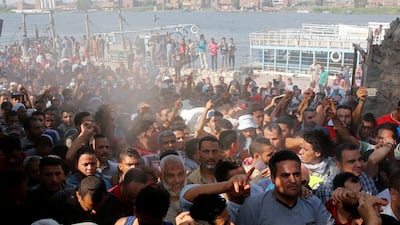Residents of El Warraq, a Nile island north of Cairo that houses a large underprivileged community, held demonstrations on Tuesday to protest against their eviction.
Footage shared on social media showed the island’s residents in heated exchanges with security officials, during which they threw rocks at police in riot gear. Clips also showed mass demonstrations, with residents chanting slogans and carrying banners.
Egypt’s Housing Ministry this month announced it had reclaimed 71 per cent of the island into the state’s possession, confirming it had removed what it called “squatters”, whose residence on the island was illegal in the state’s reckoning.
Rights groups have denounced what they call the use of excessive violence against residents during the evictions, with the Land Centre for Human Rights issuing a statement on Monday in support of the community.
Residents of the island have decried the plan to transform the area into an upmarket residential development and change its name to Horus, because when seen from above the territory forms the shape of an eye.
El Warraq currently houses about 200,000 residents. Many are members of families who have lived on the island for hundreds of years, with a culture that is distinct from that of Greater Cairo.
Residents say they have repeatedly shown officials legal documents proving that they own their homes, to no avail.
Previous attempts to evacuate El Warraq in 2017 resulted in serious clashes, when one resident was killed and several security officers injured.

In 2017, the residents formed a council to liaise with the government about the intended development plan. The committee included a member from every family living on the island.
“The council’s list of demands include: no negotiations or discussions with any official until the government submits the urban and development plan to the council so there is community dialogue to avoid any potential for damages and to determine the position of the people on it,” a council member told the Al Masry Al Youm newspaper in 2017.
After the clashes five years ago, a property developer posted photos of a development plan for El Warraq island, which were also shared by a firm of architects, which at the time said it was participating in the project. The blueprints for the island’s development went viral on social media. Both of the companies’ claims were denied by the country’s Housing Ministry, which said no contracts were signed.
However, the ministry this month said the island’s development plan was well under way, with the first phase comprising 94 skyscrapers containing 4,092 residential units. The new plan is also set to include a large central park and two marinas, the ministry said.


